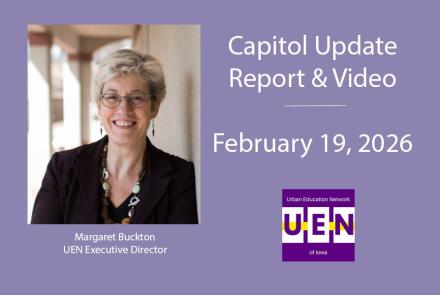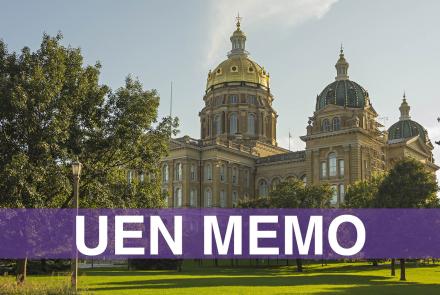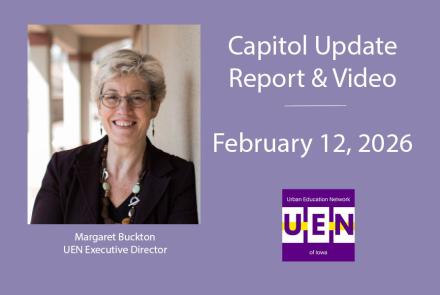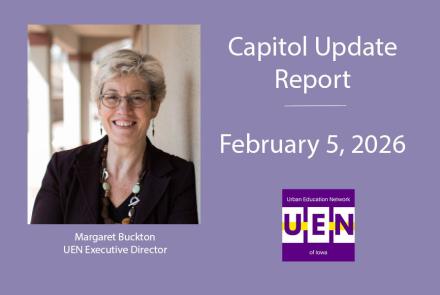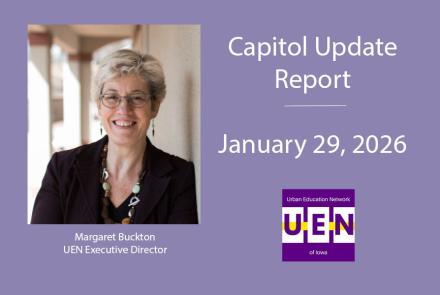Capitol Update - February 2, 2024
UEN Legislative Update
February 2, 2024
Download the Printable Version of this Report
This UEN Weekly Report from the 2024 Legislative Session includes:
- UEN Priority Subcommittees: PK Weighting, SSA and Open Enrollment Deadline
- Governor’s Teacher Salary and AEA Overhaul Subcommittees, UEN priorities and next steps
- Guidehouse Report on Special Education in Iowa
- Income Tax Cut Legislation
- Committee Action
- Subcommittee Action
- Advocacy Actions
- Links to Advocacy Resources
UEN Priorities PK, SSA and Open Enrollment Deadlines
- SF 2075 PK Weighting: allows schools to count students below 185% of the FPL for PK weighting, phasing in from 0.5, to 0.75 to 1.0 over three years. Requires instructional hours to match (10, 15, 20). Approved 3-0. UEN supports as a priority.
- SSB 3122 School Foundation Aid: No number in the bill, as it simply states that the legislature will enact SSA during the 2024 Session. Subcommittee of Evans, Rozenboom and Quirmbach. UEN is registered opposed. The SSA increase must at least meet inflation and be set in a timely manner.
- SF 2011 Open Enrollment Deadlines: reinstates a March 1 open enrollment deadline and specifies good cause exceptions to the deadline. Allows an open enrollment requested after the deadline without good cause to proceed if both the sending and receiving school boards agree. The Subcommittee recommended moving the bill forward to the full Senate Education Committee. UEN supports.
- SF 2010 School Start Date: allows schools to start their Fall calendar beginning no earlier than the Tuesday following the conclusion of the state fair. The Subcommittee recommended amendment and moving the bill to the full Education Committee. UEN supports.
Teacher Pay and AEA Overhaul Governor’s Bill Subcommittees Held: Subcommittees in the House and Senate met on Wednesday of this week. There was a full hour of testimony alternating between advocates supporting and opposing the bill in both chambers. Those opposed were generally concerned about lost AEA services, rural schools not having enough support, concentration of power at the state level without confidence in the DE’s capacity to carry out duties assigned, stories of successes of students that were due to AEA support, and echoed the thousands of emails from constituents to legislators. Those in support of the bill valued school district control of resources, the need to improve services for students with disabilities, lack of oversight in the current system, the system is old and it is time to update it, property tax relief, more control in the hands of teachers and parents. The teacher pay provisions, estimated to invest $96 million in teacher pay received support, but none provided feedback or suggestions on a different way to distribute funds.
- SSB 3073 Senator Evans and Rozenboom signed the subcommittee report to move the bill forward to the full committee. Sen. Evans indicated that neither the bill nor the amendment addressed concerns.
- HSB 542 Rep. Wheeler stated that the bill needed more work and did not sign the subcommittee report.
- UEN is working with the Sen. Republicans and the Governor’s office to continue improving the bill. Our goal is to be at the table, focus the conversation on students, and make data-based decisions, including a better understanding of how Iowa’s system of identifying students with disabilities impacts services, test scores and expenditures. We support more school district control of resources, minimizing the role of the DE, preserving an equitable and responsive AEA system and making a significant investment in teacher pay. UEN leaders are conscious of the needs of all school districts providing special education services to students, including rural schools, and understand our collective responsibility to provide a safety net for districts without the capacity to meet the needs of their students.
An update of continued conversations with Senate Republicans and the Governor’s staff shows progress on UEN concerns, including:
- An evaluation of Iowa’s model of identifying students with disabilities, services provided, and the impact on student outcomes and costs, recommendation for system improvement and best practices in other states. On the table to engage in an independent review of Iowa’s system of noncategorical identification system.
- Allow AEAs to deliver educational and media services that districts want and depend on. Agreed to in the first amendment.
- Restore $32 million in media services funding. Allow districts to use that money to provide media services by contracting with AEAs or others as determined by the district. For the 2024-25 school year, districts retain 100% of media services funding. For the 2025-26 school year, 50%, and for the 2026-27 school year, 25%. No additional media services property taxes in years beginning on or after July 1, 2027.
- Eliminate the timelines in the bill for decisions by April 30 and the minimum two-year commitment for districts to contract with AEAs for special education services. Encouraged by commitments to change timelines. Education Services and Media Services funding stays with school districts beginning July 1, 2024. Continues Special Education flow through for the 2024-25 school year, but beginning July 1, 2025, special education funds are under school district control. Districts must decide by Feb. 1, 2025, to commit to AEAs for delivery of special education services for the 2025-26 school year. AEA and districts may contract for services after that deadline, too.
- Keep Child Find and Early Access with the AEAs. $177 million in federal funding will stay with AEA for Child Find and Early Access.
- Expansion of DE Control should be limited: the job of DE Director authority over all AEA FTEs and salaries, approval of all services, and other duties contained in the original draft of SSB 3074 and HSB 542 is too much concentration of power. Stakeholders do not yet have trust or confidence in the DE’s capacity to do this job well with so many other things on the DE’s plate (new ESSA state plan, for example). We agree that DE should have special education experts to competently administer compliance with ESSA and align school improvement in core instruction. Progress made:
- Agreement to limit the DE Director’s authority to dissolve or merge an AEA only if an AEA is not in compliance with accreditation, is fiscally insolvent, or in response to a petition of districts in the AEA.
- DE must publish a list of scientific, evidence-based and peer-reviewed professional development that AEAs can provide. If a district and AEA want to engage in a PD program not on the list, the DE will have a process for requesting something be added to the approved list. DE can also work with AEAs to provide PD related to state initiatives and implementations.
- Require DE to approve staffing FTEs for any positions directly providing services. DE authority to approve or deny positions is limited to other positions.
- Require 3 AEA board members and 2 superintendents from the AEA to be appointed to the committee to assist with vetting, interviewing and advising the DE director of the lead administrator.
- Protection for special circumstances/services that AEA can provide that require regionalization, including residential facilities with student adjudicated for services, Therapeutic Classrooms, and crisis services. No progress yet, but the delay of special education changes until July 1, 2025 allows time for planning, determining impacts and requesting resources and legislative changes.
- We support AEAs having control over their property and equipment. Limit Department of Administrative Services (DAS) oversight or assumption of property to AEAs undergoing dissolution or reorganization. Require DAS, if requested by DE Director, to provide market analysis of proposed property purchases or leases, to be provided in the Director’s report to the State BOE in approving or denying such purchases, lease purchases or leases. If any property or equipment that local districts previously provided to AEAs is subject to a dissolution or reorganization, allow the district to request the property or equipment be returned to the school.
- We are still searching for clarity on the numbers and estimates shared with school districts and mentioned in the Governor’s Condition of the State address. This includes the local district financial impacts, the reference to $529 million in AEA funding, and the adjusted average amount Iowa spends on students with special needs that is stated as $5,331 more than the national average expenditure. Understanding where the Governor’s numbers come from and how local leaders can trace them back to their own financial documents will build trust and restore some faith in the experts at the state level.
- There are many stakeholders impacted by system changes of this magnitude. We encourage the House and Senate to work with AEAs, school leaders, teachers and others to continue to make changes to the bill focused on improved outcomes for students with disabilities and better core instruction, which will improve outcomes for all students.
UEN is registered as undecided on the bill, but may consider changing to support based on member input as our confidence in the amendments above unfolds. See the Jan. 12 UEN Weekly Report for a complete summary of HSB 542 AEA Overhaul and Teacher Pay Minimums. Please let us know what member suggestions you might have to the bill to further improve outcomes for students with special needs and provide needed services for Iowa school districts.
Guidehouse Report on Iowa Special Education
FOIA request by the Bleeding Heartland requested a copy of the report, now posted on their website here: https://www.bleedingheartland.com/static/media/2024/01/Guidehouse-report-on-Special-Education-in-Iowa.pdf Guidehouse claims as reported in the Iowa Capital Dispatch, June 30, 2024, “Consultant: Iowa pays more, but gets less, for special education” with UEN comments in italics follow.
- School districts are required by law to “cooperate” with AEAs in providing special education instructional programming. AEAs exercise “vast control over the education of students with disabilities with little oversight from school districts and the DE.”
- Iowa spends $5,331 more per pupil on special education than the national average, but Iowa’s students with disabilities perform below the national average, the consultants reported. Noting that the AEAs were created by statute to “be an effective, efficient, and economical means” of serving students with special-education needs, Guidehouse stated those same students are currently “struggling to reach academic proficiency in comparison to students with disabilities across the nation.” Guidehouse did not mention Iowa’s unique system of identifying students with disabilities based on discrepancy from peers rather than diagnosed disability or the fact that Iowa schools exit proficient students from special education if they no longer need support. Likewise, 12 states, including high-expenditure states of NY, PA, MA, MN, and VT reported zero special education state expenditures. It’s also possible that inadequate regular program educational funding requires the special education funding to work harder. According to US Census data, Iowa spent $3,081 less per pupil in all expenditures for the 2022 fiscal year.
- “In addition, federal annual performance audits show Iowa’s AEAs are a factor in Iowa failing to comply with certain federal standards. In the report, Iowa is cited as one of only 13 states to be placed in the “needs assistance” category for two or more consecutive years in some areas of federal compliance.” The Early Access targets for compliance required 100% timely action. FFY 2021, during the pandemic, further stressed families and employees cautiously staying home when ill. In every case of noncompliance in this area, AEAs were very close to the target, and usually well above the baseline, despite the pandemic.
|
This chart, included in the Governor’s Budget in Brief, is in the Guidehouse report, page 24. We still are attempting to confirm the “adjusted special education per pupil expenditure” The Guidehouse report notes that 12 states reported zero special education expenditures, among them some very high cost states (NY, MA, PA, MN, VT) Some questions: why is the oldest data, 2019 scores, more evident by color selection than the more recent data, 2022? Why does the scale for test scores not start at zero? Is there anything about Iowa’s low regular per pupil expenditures (35th in the nation per US Census) that may explain why special education costs could be relatively higher? |
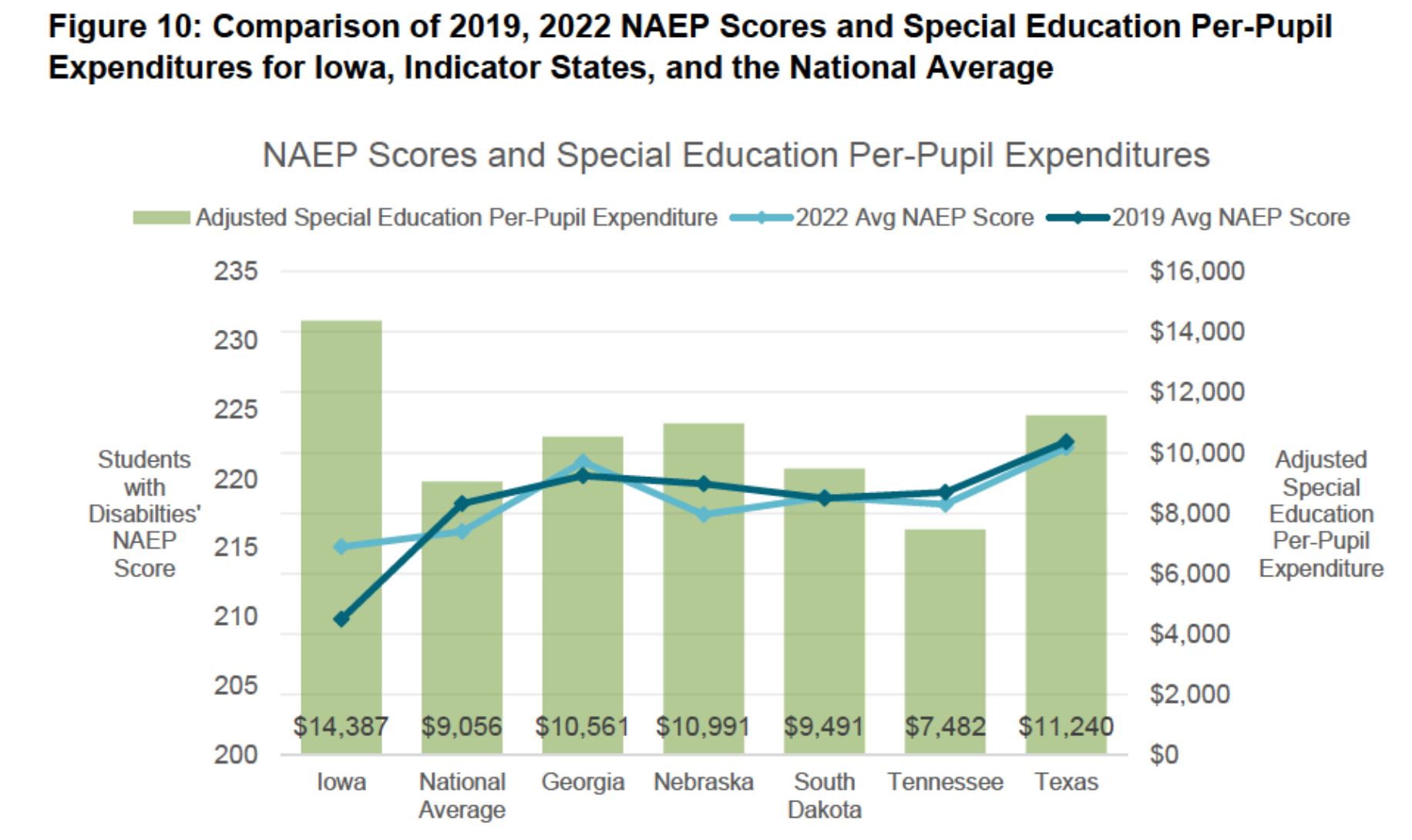
Same data, zero axis:
Average NAEP Scores for Students with Disabilities Iowa and Certain States
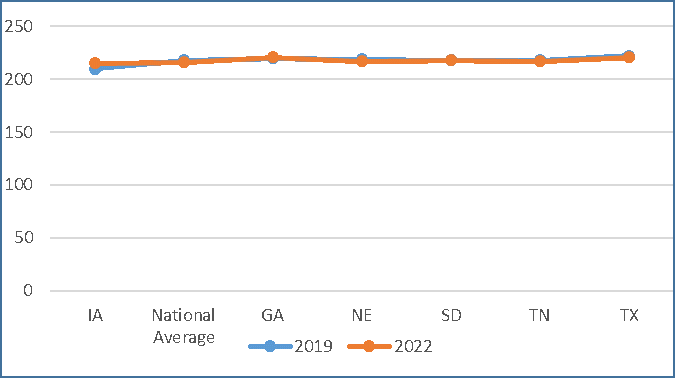
See the Jan. 29 Weekly Report for information on Iowa’s Status of “Needs Assistance” letter from the Federal Office of Special Education Programs (OSEP). See a copy of the letter dated June 23, 2003, found on OSEP website here: https://sites.ed.gov/idea/files/IA-aprltr-2023b.pdf
Income Tax Cut Legislation
SSB 3141 Income Tax Reductions was introduced on Feb. 1 with a subcommittee of Sens. Dawson, Driscoll, Jochum, Koelker, and Petersen assigned. The Feb. 2 Iowa Capital Dispatch reported: Rep. Bobby Kaufmann, R-Wilton, and Sen. Dan Dawson, R-Council Bluffs, introduced the legislation, Senate Study Bill 3141. The bill expands on the 2022 law reducing Iowa’s income tax rate to a single rate of 3.9% by 2026. Under the new proposal, the tax rate would drop in 2026 to 3.775% and fall again to 3.65% by 2027.
In subsequent years, further individual income tax reductions would be financed using the creation of the “Iowa Taxpayer Relief Trust,” which would receive an initial $2.6 billion transfer from the existing Taxpayer Relief Fund. Money from the trust, 5% each year, would be transferred to the “Income Tax Elimination Fund” and dedicated to individual income tax reductions until the tax reaches 0%.
The Iowa Capital Dispatch article also explains, Reynolds’ tax bill, House Study Bill 543, also proposes cutting individual income taxes, but does not move toward its complete elimination. Her proposal would bring the tax the current 5.7% rate to 3.65% in 2024, applied retroactively to the beginning of the year, with a drop to 3.5% in 2025. House Speaker Pat Grassley said he spoke with Kaufmann about the income tax proposal, but that “the priority is still going to be for the short-term, and for this session, looking at how we can speed up the current income tax (cuts).” UEN is registered opposed to these bills.
Committee Action House Education Committee
HF 2278 Open Enrollment Transportation by Education: strikes requirements that a sending and receiving district agree to arrangements for transportation for an open-enrolled student. Amended to only allow a receiving district bus into the resident district by no more than 2 miles, limited to only pick up students whose resident is closer to the receiving district’s attendant center than their own, and limits to school districts below 2,000 students, unless a small district comes into the larger district to pick up students, than the larger district can do the same. Amended and passed, 20-2. Moves to the House Calendar. UEN was opposed, but with the amendments, may change our registration to undecided. Formerly HF 134.
HF 2280 Home School Requirements by Education: strikes requirements that a parent of a home-schooled child (competent private instruction) give proof to a school district that the child has been immunized and had a blood lead test. Requires the name and age of a child in addition to the course of study for a home-schooled child be reported to the school district. Strikes the definition of an outline of the course of study. Requires instruction that is appropriate to the age of the child for home-school study and strikes requirements that the child be related to the primary instructor. Strikes limits on the number of unrelated children and the requirement to not charge tuition in the definition of independent private instruction. Deems such instruction not to be an accredited non-public school. Passed by a vote of 14-8. Moves to the House Calendar. UEN is opposed. Formerly HF 464.
HF 2261 BOEE Grooming Investigations by Education: strikes the requirement that BOEE investigations about the misconduct of a practitioner involving behavior that led to an inappropriate or romantic relationship be done within three years of the conduct. Passed by a vote of 14-8. Moves to the House Calendar. UEN is registered undecided. Formerly HSB 564.
HF 2270 Investigation Protections by Education: extends the confidentiality protections for investigations by the BOEE to non-licensed school employees. Requires the BOEE to report investigative information that indicates a crime has been committed to law enforcement, despite any confidentiality protections. Passed by a vote of 22:0. UEN supports. Formerly HSB 567.
HSB 585 School Start Date by Education: allows the earliest school start date to be the Monday preceding August 23 if August 23 is a weekday. Passed by a vote of 21:1. Moves to the House Calendar. UEN supports. Awaiting a new bill number.
Senate Education Committee
SF 2196 Vaccination Information by Education: requires a school nurse include information on exemptions when communicating with parents about vaccination requirements. Requires schools to post exemption information on the internet. Amended and passed 11-5. Moves to the Senate Calendar. UEN is undecided. Formerly SF 2003.
SF 2190 SAVE Fund Enrollment for CON by Education: includes the number of open-enrolled students in the certified enrollment for schools for determining if the school needs a certificate of need before spending SAVE funding on new buildings. Applies to very small school districts. Passed by a vote of 16-0. UEN is undecided. Moves to the Senate Calendar. Formerly SF 2006.
SF 2191 Active Shooter Alarms by Education: requires schools, including charter schools, to have a policy on how students, employees and others regularly in the school are to respond to a fire alarm set off due to an active shooter. Passed on a vote of 16-0. UEN is registered as undecided. Moves to the Senate Calendar. Formerly SF 2017.
SF 2189 Therapeutic Classroom Funds by Education: authorizes the DE to transfer any remaining funds from the appropriation for reimbursement of transportation claims for therapeutic classroom services to the Therapeutic Classroom Incentive fund. Passed on a vote of 16-0. Moves to the Senate Calendar. UEN supports. Formerly SSB 3044.
SF 2192 State Academic Standards Process by Education: changes references for the state Board of Education to no longer require adopting rules in order to establish a core curriculum. Makes prior rules effective until rescinded. Passed on a vote of 14-2. Moves to the Senate Calendar. UEN supports. Formerly SSB 3045.
SF 2185 Transitional Coaching by Education: strikes the requirement that a person seeking a transitional coaching authorization complete a course on professional responsibilities from the BOEE. Amended and passed on a vote of 16-0. Moves to the Senate Calendar. UEN is undecided. Formerly SSB 3049.
SF 2195 Teaching Early Elementary Reading: requires beginning July 1, 2026, that districts include evidence-based early reading instruction that follows scope and sequence and that is direct, systematic, explicit, responsive, and consists of 1) phonics including decoding and encoding and instruction in wiring, 2) phonemic awareness and phonological awareness, 3) fluency, including oral language development, 4) vocabulary and 5) Comprehension, including building background knowledge. Also prohibits, beginning July 1, 2026, the use of the three-cuing instructional model designed to teach students to read based on meaning drawn from context, structure and syntax, visual cues and pictures, or memory. Was amended to apply the prohibition only to the teaching of encoding and decoding words. Passed on a vote of 12-4; UEN is registered undecided. Formerly SSB 3069.
SF 2206 Charter School Activities: requires that a student in a virtual charter school be allowed to participate in extracurricular activities at the school in the district or residence. Allows a charter school under the group-state board model to make an agreement with other schools for interscholastic activities for its students. Passed by a vote of 16-0. Moves to the Senate Calendar. UEN is undecided. Formerly SSB 3072.
Subcommittee Action
HF 2031 Pregnancy Education: Requires human growth and development curriculum in grades 1-8 to include human biology related to pregnancy, human development in the womb, a high-definition ultrasound video, at least three minutes in duration, showing the development of the brain, heart, sex organs and other vital organs in early fetal development, a high-quality, computer-generated rendering or animation, comparable to the meet baby Olivia video developed by live action, showing the process of fertilization and every stage of human development inside the uterus, noting significant markers in cell growth and organ development for every significant marker of pregnancy until birth. The bill moved forward on a subcommittee vote of 2:0 to the House Education Committee. UEN is opposed.
HF 2073 School Chaplains: allows schools to have volunteer chaplains or employee chaplains. Does not require that the chaplains be licensed. The Subcommittee moved the bill forward, 2:0, to the House Education Committee. UEN is opposed.
SSB 3068 Online State Assessment: allows virtual public, nonpublic and charter schools to administer required state assessments online, including appropriate proctoring requirements. The Subcommittee recommended the bill move forward to the full Education Committee. UEN is undecided.
SF 2004 Dyslexia Endorsement Grant Program: requires DE to establish a dyslexia endorsement grant program. The Subcommittee recommended moving the bill forward to the full Education Committee. UEN is supports.
SF 2103 School Mental Health Resources Posting: requires school districts to post mental health resources on the district website. The Subcommittee recommended amendment and moving the bill forward to the full Education Committee. UEN is registered as undecided.
SSB 3112 Education Land Sales: prohibits local governments, including school districts, from having a deed restriction regarding a sale of property prohibiting the sale to a private or charter school. Requires a local government, including a school, to offering a right of first refusal to a private or charter school when selling property. The Subcommittee recommended moving the bill to the full committee, with two votes in favor. UEN is opposed.
Advocacy Actions This Week: School Funding, AEA Overhaul Changes, Quality Preschool
Adequate School Funding: Contact legislators regarding SSA, the Governor’s recommendation of 2.5% falls short of inflation. The teacher salary investment in the Governor’s proposal is a really good start, but SSA has to keep pace or our staff and programs for students will be compromised. See the UEN Issue Brief for additional information. The deadline for deciding SSA is Feb. 9, so the advocacy window is tightening. No bills sponsored by Republicans have yet been introduced to set the SSA rate. Additional Supports:
See the UEN website for an UEN Issue Brief providing education funding history, comparing total Iowa education expenditures per pupil, which most recently ranked our state as 35th in the nation, now spending more than $3,000 per student LESS than the national average, and including some talking points to help you advocate with your legislators. UEN’s Legislative Priority supports an SSA rate that at least matches the inflation rate schools are experiencing.
State Foundation Aid and Per Pupil Funding Increase: the Governor recommends a 2.5% increase in the state cost per pupil. The total state cost of State Foundation Aid is $3.730 billion for FY 2025, an increase of $62.3 million compared to estimated FY 2024. Increases the state cost per pupil from $7,635 to $7,826, which is $191 per student. The 2.5% proposed increase also applies to supplementary weightings (Preschool, Special Education, English-Language Learners or Concurrent Enrollment, for example), to categorical funds (TLC, PD, TSS and EICS, for example), and also applies to AEA per pupil funding. The transportation equity payments also increase by 2.5%, an increase of $759,000.
FY 2025 ISFIS New Authority Calculator allows users to set the SSA rate and calculate the impact for all districts for FY 2025 on your regular program (not including special education or other supplemental weightings or categoricals). Enter the SSA percentage increase and your Budget Enrollment and you can compare to the new money you’d receive if the SSA rate matched inflation (either 3.1% for CPI and 4% for Core Inflation) compared to the Governor’s Recommendation of 2.5%.
Governor’s AEA and Teacher Pay Bill: Contact Legislators with the following regarding HSB 542 and SSB 3073:
- UEN leaders are enthusiastic about considering changes to special education and AEAs that are thoughtful, provide adequate stakeholder input, and adequate time to make wise choices in transitioning to anything different. Chaotic transitions will interrupt the quality and quantity of services for students with disabilities.
- Concerns about state oversight have been shared by the Governor’s office. UEN leader support local control for school districts. We also want to ensure that all students, including those is smaller or rural districts, have the resources they need to serve their students. Keep improving the bill.
- UEN supports big investments for the teacher pay provisions. We need to emphasize that our major concerns with HSB 542 are primarily related to the AEA provisions. See the article above regarding UEN requests to improve the bill.
- Keep talking about this bill. We do not want to be surprised by a bill that appears later in session.
Quality Preschool and Other UEN Priorities: in every communication, find a way to mention Quality Preschool and Teacher and other Staff Shortages. See SF 2075 Expanded Preschool described above in Subcommittee action, assigned to the Senate Education Committee and contact Senators to support it. Find Issue Briefs and other resources on the UEN Advocacy website to find talking points or other resources to share when you meet with policymakers.
Connecting with Legislators: To call and leave a message at the Statehouse during the legislative session, the House switchboard operator number is 515.281.3221 and the Senate switchboard operator number is 515.281.3371. You can ask if they are available or leave a message for them to call you back. You can also ask them what’s the best way to contact them during session. They may prefer email or text message or phone call based on their personal preferences.
Find biographical information about legislators gleaned from their election websites on the ISFIS site here: http://www.iowaschoolfinance.com/legislative_bios. Learn about your new representatives and senators or find out something you don’t know about incumbents.
Find out who your legislators are through the interactive map or address search posted on the Legislative Website here: https://www.legis.iowa.gov/legislators/find
UEN Advocacy Resources: Check out the UEN Website at www.uen-ia.org to find Issue Briefs, UEN Weekly Update Legislative Reports and Videos, UEN Calls to Action when immediate advocacy action is required, testimony presented to the State Board of Education, the DE or any legislative committee or public hearing, and links to fiscal information that may inform your work. The latest legislative actions from the Statehouse will be posted at: www.uen-ia.org/blogs-list. See the 2024 UEN Advocacy Handbook, which is also available from the subscriber section of the UEN website.
Contact us with any questions, feedback or suggestions to better prepare your advocacy work:
Margaret Buckton
UEN Executive Director/Legislative Analyst
margaret@iowaschoolfinance.com
515.201.3755 Cell
Thanks to our UEN Corporate Sponsors:
Special thank you to your UEN Corporate Sponsors for their support of UEN programs and services. Find information about how these organizations may help your district on the Corporate Sponsor page of the UEN website at www.uen-ia.org/uen-sponsors.
- Public Progress LLC - thepublicprogress.com
- Solution Tree - www.solutiontree.com/st-states/iowa


